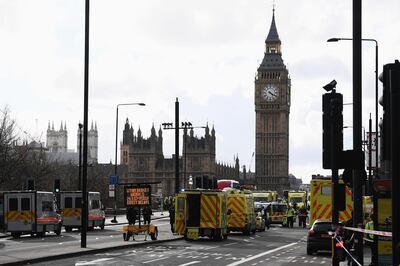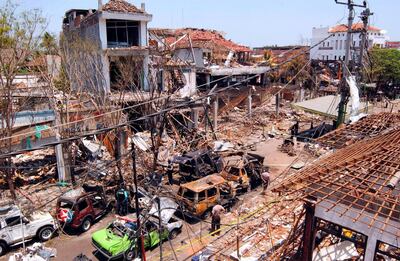The military leader of Al Qaeda-linked terrorist group Jemaah Islamiah has revealed the group used supermarket charity boxes to fund attacks, including the 2002 Bali bombings.
Aris Sumarsono, known as Zulkarnaen, was one of the world’s most wanted men, with the US placing a $5 million bounty on his head until his capture after 18 years in November.
The biologist is suspected of being the mastermind behind the Bali bombings which killed more than 200 people, and many other attacks.
One of those killed in Bali was 39-year-old Jonathon Elwood, the brother of British politician Tobias Elwood, who was hailed as a hero after he tried to save the life of a police officer killed in the London Westminster terror attack in 2017.

Counterterrorism police in Indonesia finally apprehended Zulkarnaen following a raid at a house in the East Lampung district of Sumatra island.
During his interview police told Australia Press Agency he revealed one of the methods of gaining funding for the terror group was through charity boxes placed in food stores.
They estimate more than 20,000 charity boxes were used to collect cash for the terrorists in 12 regions of Indonesia unbeknownst to the stores’ owners.
Zulkarnaen also told them the Bali bombing plan was hatched following a meeting between him and Encep Nurjaman, also known as Hambali, believed to be an Al-Qaeda lieutenant in South-East Asia, after Hambali told him they needed to conduct an attack on foreigners.
“Zulkarnaen was known as a very, very, dangerous person globally and in Indonesia,” National Police spokesman Aswin Siregar said. “We will continue to crack down all related to his network.”
Mr Siregar’s colleague, National Police spokesperson Ahmad Ramadhan, said Zulkarnaen was the military commander of Jemaah Islamiyah and had been on Indonesia’s wanted list for 18 years.
Mr Ramadhan said Zulkarnaen is suspected of being involved in the making of bombs used in a series of attacks, including the 2002 Bali bombings and a 2003 attack on the JW Marriott Hotel in Jakarta that killed 12.
Zulkarnaen was also the mastermind of a bomb attack on the official residence of the Philippine ambassador in Jakarta in 2000 that killed two people, a 2004 suicide attack outside the Australian Embassy that killed nine, and a 2005 bombing in Bali that killed 20, Mr Ramadhan said.
Police say he also orchestrated church attacks that occurred simultaneously in many Indonesian regions during Christmas and New Year's Eve in 2000 that killed more than 20 people, and was the architect of sectarian conflict in Ambon and Poso from 1998 to 2000.
Zulkarnaen, a biologist who was among the first Indonesian militants to go to Afghanistan in the 1980s for training, was an instructor at a military academy there for seven years, Mr Ramadhan said.
Since May 2005, Zulkarnaen has been listed on an Al Qaeda sanctions list by the UN Security Council for being associated with Osama bin Laden and the Taliban.
The Security Council said that Zulkarnaen, who became an expert in sabotage, was one of Al Qaeda’s representatives in South-East Asia and one of the few people in Indonesia who had had direct contact with bin Laden’s network.

It said that Zulkarnaen led a squad of fighters known as the Laskar Khos, or Special Force, whose members were recruited from among some 300 Indonesians who trained in Afghanistan and the Philippines.
Zulkarnaen was appointed the head of Camp Saddah, a military academy in the southern Philippines established for fighters from South-East Asia, the Security Council said.
He spent a decade at the camp training other Jemaah Islamiyah members and became operations chief for the group after the arrest of his predecessor, Hambali, in Thailand in 2003.
Hambali is now being held by the US in Guantanamo Bay.


